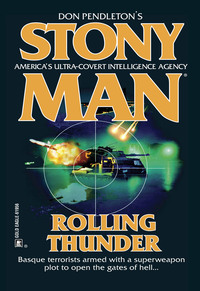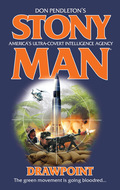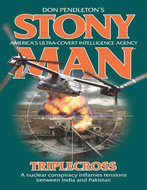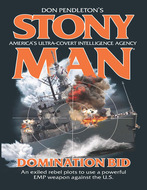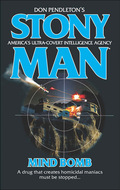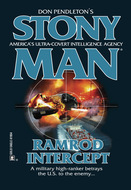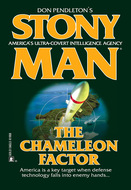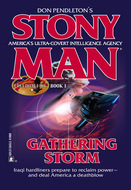Buch lesen: "Rolling Thunder"
“WHAT DO YOU HAVE THERE?” BROGNOLA ASKED
“A wild card out of left field,” Tokaido responded. “You aren’t going to believe it.”
“At this point, I’d believe just about anything,” Kurtzman said.
“It’s from Striker,” Tokaido stated. “He and the CIA ops he was working with just cracked that terrorist cell they were tracking in Jordan.”
“That’s good news,” Brognola said. “But how does that fit in with the situation in Spain?”
“They got a guy into interrogation,” Tokaido reported, “and get this—he says the Iraqis had an agent fly into northern Spain earlier this week to meet with the BLM. They’re trying to get their hands on some nukes and maybe even the supertank.”
“That’s out of left field, all right,” Kurtzman muttered.
“I don’t like the sounds of new players,” Brognola said. “It puts everything in a whole new light.”
Other titles in this series:
STONY MAN VI
STONY MAN VII
STONY MAN VIII
#9 STRIKEPOINT
#10 SECRET ARSENAL
#11 TARGET AMERICA
#12 BLIND EAGLE
#13 WARHEAD
#14 DEADLY AGENT
#15 BLOOD DEBT
#16 DEEP ALERT
#17 VORTEX
#18 STINGER
#19 NUCLEAR NIGHTMARE
#20 TERMS OF SURVIVAL
#21 SATAN’S THRUST
#22 SUNFLASH
#23 THE PERISHING GAME
#24 BIRD OF PREY
#25 SKYLANCE
#26 FLASHBACK
#27 ASIAN STORM
#28 BLOOD STAR
#29 EYE OF THE RUBY
#30 VIRTUAL PERIL
#31 NIGHT OF THE JAGUAR
#32 LAW OF LAST RESORT
#33 PUNITIVE MEASURES
#34 REPRISAL
#35 MESSAGE TO AMERICA
#36 STRANGLEHOLD
#37 TRIPLE STRIKE
#38 ENEMY WITHIN
#39 BREACH OF TRUST
#40 BETRAYAL
#41 SILENT INVADER
#42 EDGE OF NIGHT
#43 ZERO HOUR
#44 THIRST FOR POWER
#45 STAR VENTURE
#46 HOSTILE INSTINCT
#47 COMMAND FORCE
#48 CONFLICT IMPERATIVE
#49 DRAGON FIRE
#50 JUDGMENT IN BLOOD
#51 DOOMSDAY DIRECTIVE
#52 TACTICAL RESPONSE
#53 COUNTDOWN TO TERROR
#54 VECTOR THREE
#55 EXTREME MEASURES
#56 STATE OF AGGRESSION
#57 SKY KILLERS
#58 CONDITION HOSTILE
#59 PRELUDE TO WAR
#60 DEFENSIVE ACTION
#61 ROGUE STATE
#62 DEEP RAMPAGE
#63 FREEDOM WATCH
#64 ROOTS OF TERROR
#65 THE THIRD PROTOCOL
#66 AXIS OF CONFLICT
#67 ECHOES OF WAR
#68 OUTBREAK
#69 DAY OF DECISION
#70 RAMROD INTERCEPT
#71 TERMS OF CONTROL
Rolling Thunder
STONY MAN®
AMERICA’S ULTRA-COVERT INTELLIGENCE AGENCY
Don Pendleton

This book is dedicated to Feroze Mohammed, for patience, support and understanding far beyond the call of duty
CONTENTS
PROLOGUE
CHAPTER ONE
CHAPTER TWO
CHAPTER THREE
CHAPTER FOUR
CHAPTER FIVE
CHAPTER SIX
CHAPTER SEVEN
CHAPTER EIGHT
CHAPTER NINE
CHAPTER TEN
CHAPTER ELEVEN
CHAPTER TWELVE
CHAPTER THIRTEEN
CHAPTER FOURTEEN
CHAPTER FIFTEEN
CHAPTER SIXTEEN
CHAPTER SEVENTEEN
CHAPTER EIGHTEEN
CHAPTER NINETEEN
CHAPTER TWENTY
CHAPTER TWENTY-ONE
CHAPTER TWENTY-TWO
CHAPTER TWENTY-THREE
CHAPTER TWENTY-FOUR
CHAPTER TWENTY-FIVE
CHAPTER TWENTY-SIX
CHAPTER TWENTY-SEVEN
CHAPTER TWENTY-EIGHT
CHAPTER TWENTY-NINE
CHAPTER THIRTY
CHAPTER THIRTY-ONE
CHAPTER THIRTY-TWO
EPILOGUE
PROLOGUE
Nacional Parc Guell, outskirts of Barcelona, Spain
With a faint snap, the thick limb of a towering beech tree tumbled down from the forest canopy and crashed at Angelica Rigo’s feet. More than a dozen other branches, all festooned with dark green leaves, lay in a growing mound at the base of the tree. Rigo, a thirty-year-old, ruddy-skinned woman wearing khaki shorts and a matching sleeveless top, wiped the sweat from her brow and checked her watch, then looked up at the handful of men trimming the other branches in the tree above her. She barked at them in Euskara, native tongue of the Basques.
“Can’t you work any faster?”
One of the men glanced down from his perch and waved his small, curved handsaw. “Let us use chain saws instead of these toys, and we’ll have this tree down three times as fast.”
“And you’d be ten times as loud doing it,” Rigo countered, fighting back an urge to shout. “How many times do I have to tell you we need to do this quietly?”
“You keep telling us that,” the other man called down, “but what is the point? We’re miles from anywhere. Who’s going to hear us except the birds and squirrels?”
A few of the other men in the tree laughed lightly and murmured among themselves. Staring up at them, Rigo fumed. What had happened to the days when those who joined the movement could be counted on to work with dedication and without complaint? Why was it that she always found herself saddled with slackers and malcontents?
“Just keep working!” she told the men. She hesitated a moment, then grudgingly added, “Have this tree down by sunset and there will be wine with rations tonight!”
As expected, the promise of drink motivated the men, and they began to lay into their work with increased vigor. Rigo lit a cigarette as she watched them. They still needed to clear away another three beeches over the next two days to make the site ready. They would be cutting it close.
Another limb soon tumbled to the ground. Rigo sidestepped it and moved away from the tree, her boots treading softly on the wild grass and trailing vines that carpeted the forest floor. They were in a remote corner of Nacional Parc Guell, a densely treed nature preserve ten miles northeast of Barcelona. The nearest hiking trails were half a day’s walk away, so there was little chance that anyone would stumble upon the group illegally falling the beeches. And because the trees were being taken down with minimal disturbance of the overhead canopy, it was just as unlikely that anyone flying overhead would be able to spot the small clearing being carved out of the woods. That would be important come Friday, when the plan was to be carried out.
Rigo made her way through the trees, walking another twenty yards before coming to the edge of a steep-pitched slope that led to a broad, verdant valley. Blowing smoke from her cigarette, she stared out across the valley. Far off in the distance, barely visible through a faint afternoon haze, she could see the rising, honeycombed spires of La Sagrada Familia. The old church, designed more than a century before by infamous Barcelona architect Antoni Gaudi, was still unfinished, and Rigo saw a construction crane poised atop the highest spire like a gigantic metallic grasshopper. Provided the skies were clear on Friday, it would be easy to use the church as a frame of reference while drawing a bead on the intended target, the newly constructed Barcelona civic center, located a few miles southwest of the towers. The trajectory had already been calculated and would be assisted further by GPS readings from a surveillance drone; all that remained was to prepare the launch site and see to it that the FSAT-50 could be delivered on schedule without complications.
Once she’d finished her cigarette, Rigo unclipped her cell phone and, for the third time in the past half hour, checked to make sure it was turned on. It was, and there were still no messages. The woman slipped the phone back in its holder and retreated from the edge of the forest. The mound of trimmed branches at the base of the beech tree was growing higher. Rigo called up a few words of encouragement to her men, then went to check on the other preparations. To her right, a dozen or more smaller saplings had already been flattened, creating a corridor that soon led the woman to the banks of the Avignon River. The river, extending all the way from the uppermost reaches of the Pyrenees, formed the easternmost border of the national park and eventually drained into the Mediterranean near the Barcelona suburb of Sardana. For most of its course, the river ran deep—as much as ninety feet in places—but here there was a fork, with some of the water diverting into a shallow lagoon. The lagoon was also fed by a mountain stream carrying high levels of iron, which gave the water a faintly reddish hue. Another five men stood knee-deep in the water at the lagoon’s edge, scooping out spadefuls of mud and pitching them up onto the embankment. The mud, like the water, was rich with iron and the color of sienna.
“How goes it, Xavier?” Rigo called out to the man closest to her.
“Slow,” called back Xavier Golato, a tall, broad-shouldered man with massive arms and a shaved head glistening with perspiration. “But we are making good progress.”
“We’ll have one of the trees down by sunset,” Rigo told him. “I want to be able to cut the trunk into sections and use it for a ramp.”
“We will be ready,” Golato assured the woman. “You’ll be able to lay the trunks below the waterline like you wanted.”
“Excellent.”
Golato took in Angelica’s voluptuous figure with a faintly salacious gaze. “I have a trunk of my own waiting for you later tonight,” he whispered suggestively.
Angelica returned Golato’s gaze with one every bit as lecherous. “Just be careful not to cut it into sections first,” she taunted. “I’ll be wanting all of it.”
The lovers’ suggestive banter was interrupted when they saw several of the men stop their shoveling and glance upstream to a fork in the river. Rigo followed their gaze and saw a boat entering the lagoon. Instinctively she reached for the 9 mm Walther pistol holstered on her right hip. She relaxed her grip, however, when she recognized the craft, a small, weathered fishing boat propelled by a pair of outboard motors. There were several men on the deck. One of them waved a greeting as the boat drew closer.
“Looks like they brought company,” Golato murmured.
Rigo nodded, eyes on a man’s body sprawled out across the foredeck. A few feet from the body was a woman, gagged and bound at the wrists and ankles. Even from this distance, Rigo could see that the woman was terrified. She could also see that the woman, like the dead man, was white.
“Americans?” Angelica called out to the man who had waved to her from aboard the boat.
The other man nodded. “We came across them a quarter-mile upriver,” he replied, pointing to a small red kayak lying on the deck near the captive woman. “They were acting suspicious.”
Rigo told Golato to have the shovelers stop their work and help guide the boat to a suitable mooring spot ten yards from the section of embankment they had been excavating. After pausing to light another cigarette, she flipped open her cell phone and tried to get in touch with her brothers. Miguel and Jacque Rigo were a few hundred miles away in Bilbao, carrying out the other part of the mission. Neither of them responded. Rigo checked her watch again and frowned. She was supposed to have heard from Miguel ten minutes ago. Had something gone wrong?
Fighting back her concern, she put the phone away and strode along the bank to where the boat was being tethered. Once she’d leaped aboard, she took a closer look at the dead man and saw that he’d been shot once in the head at close range.
“He said they were just tourists, but they have sophisticated camera and radio equipment,” the captain of the boat told her, staring down at the corpse. “They were armed, too.”
Rigo looked from the body to the other woman. The prisoner eyed her beseechingly, tears streaming down her cheeks. She looked to be in her late twenties, blond haired with a sprinkling of freckles across her cheeks. She tried to say something, but her words were muffled by the gag.
“I’ll get to you in a moment,” Rigo told her in flawless English.
Then, shifting back to her native tongue, she asked the boat’s captain, “What did the sonar come up with, Enrique?”
“The readings were all good,” the captain responded. “The depth is acceptable all the way up to Catalia, and there are only a few areas where there are obstacles on the river bottom, but we should be able to maneuver around them.”
The woman smiled flatly. It was nice to have some good news for a change. Of course, Enrique had also brought back a problem with him. He knew it, too, and was quick to anticipate Rigo’s concerns. Gesturing at the woman prisoner, he said, “After I shot the other one, I told her that she would have one last chance to tell the truth once we got here. She knows she will be next if she doesn’t cooperate.”
Rigo nodded and unholstered her Walther. She stepped over the body and crouched before the other woman, eyeing her calmly as she reached for her gag.
“I’m going to take this off,” Rigo explained calmly, “then you will quietly tell us the truth, yes?”
The other woman nodded fearfully. Slowly the gag was unfastened. The prisoner gasped for air, then began to sob.
“We didn’t do anything!” she insisted. “I swear it! We’re working on a film, and we were just getting some second-unit footage of the river! That’s all we were doing! You have to believe me!”
Some of the other men on the boat brought over a crate filled with two handguns, as well as several high-priced film cameras, tape recorders and a slew of accessories. Rigo inspected the guns first. They were both small, standardized Ruger P-4 .22s. Neither had been fired. Rigo set the guns aside and picked up a telephoto lens, then looked back at the other woman.
“CIA?” she asked. “Or NATO maybe?”
“We aren’t spies!” the blonde pleaded. “I’m telling you, we’re just working on a film. A documentary about the Avignon River. We only had guns to warn off wild game whenever we came ashore. We weren’t doing anything wrong!”
Rigo ignored the outburst and looked through the crate, inspecting the woman’s passport, as well as the one taken off the corpse. Both documents seemed on the level, but Rigo knew that meant nothing. She had a dozen seemingly legitimate passports of her own back at the safehouse in Barcelona, and none of them listed her real name or the fact that she was a high-ranking member of the Basque Liberation Movement.
She turned back to the other woman. “One look at what you’ve filmed and we’ll know you’re lying.”
“Look all you want!” the prisoner said. “Go ahead! I’m telling you, it’s just nature footage! That’s all you’re going to see!”
“They tossed some film into the river when they saw us coming after them,” Enrique stated.
“That’s not true!” the blonde cried. “It wasn’t film!”
“No? What, then?”
The other woman hesitated, then said, “It was just some pot. Some marijuana and a pipe. We know about the laws here, and we didn’t want to be caught with it.”
Rigo was weighing the woman’s words when a young Basque with a wild mane of dark hair poked his head out of the boat’s cabin. “A call for you on the radio,” he told Rigo. “It’s your brother.”
“Which one?”
“Miguel.”
Rigo shared an expectant glance with Golato, then stood. It looked as if she were going to walk away from the prisoner, but suddenly she turned, casually took aim at the woman’s head and fired a round into her face, killing her instantly. As the woman slumped to the deck, Rigo holstered her gun and told Golato, “Once night falls, take them downriver to Sardana and get rid of them, along with the kayak. Make it look like they were robbed by river pirates.”
He nodded. “Done.”
Rigo excused herself and went to the cabin. The young man directed her to the transceiver, then stepped outside so that she could take the call alone.
“Miguel,” she said into the microphone, “I was beginning to worry.”
“It took longer than we’d planned, that’s all,” came the crackly response from the woman’s older brother.
“You got your hands on it, then.”
“Yes,” her brother assured her. “We have the tank.”
CHAPTER ONE
Stony Man Farm, Virginia
Rosario Blancanales jogged higher up into the foothills surrounding Stony Man Farm. It was his favorite time of day, just past dawn with the sun yet to break through the early-morning clouds. There was a briskness in the air and the valley below him was quiet and tranquil. He’d passed a few small animals—rabbits and chipmunks—and the occasional bird flapped overhead, but otherwise he felt as if he had the winding dirt path to himself.
Soon Blancanales came upon a rocky escarpment affording a panoramic view of the Shenandoah Valley. From this perspective, Stony Man Farm looked much like any number of other isolated ranch estates scattered throughout pockets of the Blue Ridge Mountains. The main house and surrounding buildings were only faintly ostentatious, seemingly part of a modest farming enterprise that included the raising of seasonal crops and, off to the north, some harvesting of wood. Behind the unassuming facade, however, the sprawling valley enclave served as the command center for the covert Sensitive Operations Group, made up of not only Blancanales’s Able Team comrades, but also the warriors of Phoenix Force and a centralized support group that rarely left the Farm’s confines.
From his vantage point, Blancanales could see a few scattered farmhands laboring in the orchards. To his right, standing atop the crest of the nearest mountain, another two men busied themselves inspecting the high, barbwire-topped cyclone fence that encircled the Farm’s perimeter. The men, like those working down below, weren’t mere hired laborers, but rather highly trained, combat-ready members of the facility. The blacksuits.
Like the security force, Blancanales was a man of deceptive appearance. With his prematurely gray hair and well-tanned Hispanic features, he looked less like a battle-trained commando than a successful businessman out for a quick jog before heading into the office at some high-rise in Washington, D.C. In fact, Blancanales had resorted to such a role while on a recent assignment, using his white-suit savvy to infiltrate a shell company fronting for an Asian gun-running operation. One moment he’d been wheeling and dealing with the company’s CEOs at a business office; the next he was fighting alongside Able Team cohorts Carl Lyons and Gadgets Schwarz, trading gunfire with a goon squad at the warehouse where the black-market guns were stored. Before the dust had settled, the men had been forced to resort to hand-to-hand combat, and Blancanales had used his mastery of bo jitsu to neutralize a pair of thugs who together outweighed him by more than one hundred pounds. Blancanales had emerged from the skirmish with only a few aches and bruises, but Schwarz had been put out of commission for a few weeks with a stress fracture of the right leg, and while Lyons had quickly recovered from a flesh wound to the shoulder, he’d been subsequently laid low by a particularly virulent strain of the flu.
Now, for the first time in weeks, Blancanales had been presented with a reprieve from the field. Once he was finished with his jog, he planned to get a ride to Dulles International so that he could fly out to California for a long overdue visit with his family in East L.A. It’d been nearly a year since he’d been home, and he was looking forward to the trip and the inevitable backyard barbecues that were always thrown together at a moment’s notice once word spread that he was coming home.
As it turned out, however, Fate had other plans in store.
Blancanales was about to start back when he heard a rustling in the brush twenty yards downhill from where he was standing. Someone was heading up the path he’d just taken.
“Yo, Pol,” a familiar voice called out. Seconds later, Blancanales spotted Akira Tokaido on the trail. The young Japanese American was a key member of the Farm’s cybernetic team. He wore his black hair up in a topknot and, as usual, was chomping away at a few sticks of bubble gum. He popped the pink balloon he’d just blown, then called out, “¿Que pasa?”
“Since when did you speak Spanish?” Blancanales asked.
“That’s about all I know,” Tokaido confessed. “But you better brush up on yours.”
“Why’s that?”
“Barbara sent me to fetch you. Something’s going down in Spain, and she wants you and Jack Grimaldi to hook up with the guys over there to check it out. Or, as Yoda might put it, ‘May the Force be with you.’”
“I think that was Obi-Wan Kenobi.”
“Whatever,” Tokaido said.
“Isn’t Phoenix on assignment in Korea?” he asked Tokaido.
“They wrapped things up there earlier this morning. They’re already on their way to Bilbao.”
Blancanales sighed. So much for downtime. “What are we up against?” he asked.
“Something about a stolen supertank. Briefing’s in ten minutes, or whenever the chief gets back from D.C. He’ll fill you in.”
As if on cue, the two men suddenly heard the faint droning of an approaching helicopter. Blancanales glanced back out over the valley and saw an unarmed OH-58D Kiowa Warrior drift over the mountaintops and begin its descent toward the Farm’s camouflaged airstrip.
“Speak of the devil,” Blancanales murmured.
“I won’t tell him you said that.” Tokaido blew another bubble, then turned and started back down the path, calling over his shoulder, “Last one down’s a rotten egg.”
Blancanales shrugged and began to lope behind Tokaido, muttering to himself, “I’ve been called worse.”
THE CHIEF WAS Hal Brognola. Also known as the head Fed, he was Stony Man’s liaison with the powers-that-be in Washington. Working under the guise of a functionary with the Justice Department, Brognola had been on a first-name basis with the past five presidents, and during that span he’d probably sat in on more meetings of the Joint Chiefs of Staff than any other person.
“I’ll try my best to keep this brief,” he began, pacing before those assembled in the basement War Room of the main house. Akira Tokaido wasn’t present; he’d gone off to join his colleagues at the computer facilities, located in the Farm’s Annex. Blancanales was there, however, seated alongside Brognola’s top aides, mission controller Barbara Price and Aaron Kurtzman, head of SOG’s cybernetic operations.
“I’m sure you’re all familiar with the FSAT-50,” Brognola said, launching into the briefing.
“Some kind of supertank, right?” Blancanales said.
The big Fed nodded. “We were building them in conjunction with Spain until last spring, when the Defense Department pulled the plug on any further U.S. financing.”
“But Spain’s kept up production,” Kurtzman recalled. “I believe they’re calling it the tank of the future. If I remember correctly, they’re rigging it to double not only as a war boat but also as a modified submarine.”
“Correct,” Brognola said. “FSAT stands for Fully Submersible Amphibious Tank. Last time it was tested underwater, it proved functional at a depth of more than a hundred feet. That’s six times deeper than you can go in a snorkel-equipped T-72. And that’s just the tip of the iceberg as far as the advancements they’ve incorporated into the design. For starters, they’ve plated the tank with some kind of lightweight armor that’s every bit as strong as DU.”
“They’re keeping a tight lid on the armor specs,” Price interjected, “but we suspect they’re using a combination of titanium and plastic along with some variant of the depleted uranium used on the Abrams. Whatever the mix, they’ve brought the weight of the tank down to under thirty tons. That’s roughly half the weight of an Abrams, but it still has an RHA rating of over 1000. On top of that, apparently the frame has built-in pockets that act as ballast tanks when they’re filled with gas.”
“Let’s not get bogged down with too many specifics,” Brognola suggested. “That’s not the issue.”
“Thank God,” Kurtzman deadpanned. “You’re starting to lose me.”
“Amen,” Blancanales said. “Let’s cut to the chase. Akira says somebody’s snatched one of these tanks. My guess is that’s where we come in.”
“Right you are,” Brognola replied. He moved to one of the monitor screens built into the wall behind him. Kurtzman had already cued up a detailed map of northern Spain. Using one of his signature cigars as a pointing stick, the head Fed indicated a spot along the coast of the Bay of Biscay. “Gamuso Armorers were building the FSATs here in Zamudio, an industrial sector on the outskirts of Bilbao,” he went on. “They were field-testing one of the prototypes yesterday afternoon when there was a raid of some sort on the test grounds. We have conflicting reports, but somewhere between twenty and thirty people were killed, most of them members of Gamuso’s training crew. Bottom line—the prototype is now missing and assumed to be in the hands of the perpetrators.”
“Who’s that?” Blancanales asked.
“The Basque Liberation Movement,” Price interjected. “They’re a splinter group of Euskadi Ta Askatasuma. The ETA.”
“Can you shorthand that a little?” Blancanales asked.
“I’ll try,” Price said. “The ETA is Spain’s answer to the IRA. They’ve been clamoring for a separate Basque state for years, and they’ve racked up fair-sized death toll in the process, mostly through car-bombings and kidnappings. The Navarra cell is the most violent of the batch, and apparently they splintered off last year because they thought the ETA was going soft.”
“Specifically,” Brognola added, “there was a falling out after the head of the Navarra cell was gunned down by a Basque counterterrorism unit known as the Ertzainta. We don’t need to focus on the Ertzainta right now.”
Price nodded and resumed. “The head of Navarra’s cell was Carlos Rigo. He was a widower with two grown sons and a daughter. The children took over the cell and demanded that the ETA drop everything it was doing and go after the men who killed their father. When the ETA balked, they decided to go it alone and formed the BLM. They managed to get their revenge, then they dropped out of sight.”
“Until last night,” said Brognola. “Now they’re back in business, and if they’ve got their hands on this tank like we think, they’ve just turned themselves into a force to be reckoned with.”
“Assuming they know how to use it,” Blancanales said.
“I think that’s a safe assumption,” Brognola countered. “They were off the radar more than six months, and my guess is they spent most of that time planning this heist. Why would they go to all that trouble unless they were sure they’d know what to do with the tank once they got their hands on it?”
“Fair enough,” Blancanales conceded, “but still, it’s only one tank, right? I don’t care how high-tech it is, it’s not like they’re suddenly armed to the teeth.”
Brognola shook his head. “That’s where you’re wrong, Pol. You see, one of the upgrades Gamuso made when they took over the development program was a retractable missile launcher. A modified Scud system to be exact. Only it’s not restricted to your usual HEAT or AA rounds.”
Blancanales sat upright in his seat, already dreading the worse. “Nukes?” he murmured aloud. “It can fire nukes?”
Brognola nodded gravely. “I’m afraid so.”
“But it wasn’t armed with warheads when they stole it, was it?” Kurtzman asked.
“No,” Brognola said, “but there’s a small item that’s been kept classified since the raid. At roughly the same time the raid was carried out, there was a power brownout inside the Gamuso facility. During all the commotion, somebody managed to gain access to the arms depot. They only had a three minute window of opportunity, but they made the most of it. Once the power was back on and security checked the premises, they came up two missiles short.”
“Both of them nukes,” Blancanales guessed.
“Yes,” Brognola confirmed. “Both missiles had nuclear warheads compatible with the tank’s launch system.”
“Inside job,” Kurtzman speculated.
“That seems a lock,” Brognola concurred. “Spain’s AMI already has the place barricaded and is interrogating all personnel. They also have the militia laying a dragnet within a hundred-mile radius of the test grounds. And their counterterrorist forces are honing in on all known BLM strongholds throughout Navarra.”
“Sounds like they’re covering all the bases,” Blancanales said. “And I hate to say it, but, bad as this all sounds, it seems like an internal problem. Why are we being brought in?”
“Good question.” Brognola turned his attention back to the monitor, this time pointing his cigar at the northeast coastline of Spain. “This Friday there’s a NATO conference being held in Barcelona. Dealing with the ETA and BLM is near the top of the agenda, and both Spain and France have already gone on record asking the other member nations for help. The President has already promised our support.”
“So the Basques want to retaliate by heaving a nuke at the conference?” Blancanales said, his voice tinged with skepticism. “Sounds like overkill, don’t you think?”
“We can’t rule it out,” Brognola insisted. “Put yourselves in their shoes a minute. Say you’ve got some global heavyweights about to gang up on you. Are you going to sit back and wait for them to make the first move? Or are you going to strike first, figuring it’s now or never?”
Blancanales nodded. “I’d go with Plan B.”
“There you have it, then,” Brognola said. “The President was on the phone all night trying to have the conference canceled or at least moved out of Spain, but he’s been overruled. Apparently the other countries feel they can’t run from these separatists and then expect to sound credible when they talk about standing up to them.”
Die kostenlose Leseprobe ist beendet.
